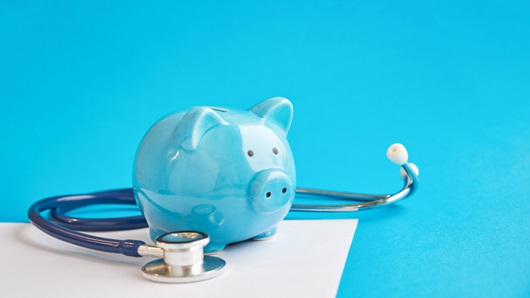Savings Account for Medical Expenses: Staying Prepared for Health Emergencies
December 16, 2024

When it comes to our health, we all want the best care possible. However, rising healthcare costs, have impacted millions of families in India. In fact, the country experienced a medical inflation rate of 14% in 2021, the highest among Asian nations. Today, having a health insurance policy may not be enough to cover burgeoning medical costs. Simultaneously, you may have to open a dedicated Savings Account for medical emergencies.
In this blog, we have deep dived into the importance opening a Savings Accounts for medical emergencies.
India’s Unique Challenges with Health Insurance Plans
Though , having a personal or family health insurance policy is an absolute must, there's still a lot of gap in terms of market penetration. A study by Policybazaar, titled 'How India Buys Insurance,' highlights the primary reasons why health insurance remains unpopular in India. Affordability and the complexity of insurance products are the two biggest hurdles.
Introducing Savings Account for Medical Expenses
Similar to Health Savings Accounts (HSAs) in the United States, savings accounts for medical expenses are designed specifically to build corpus during medical emergencies. In India, health savings accounts are still relatively new, with only a few entities providing such services.
Let’s take a look at the key features:
Differences Between Health Savings Account and Health Insurance Plans
| Health Savings Account | Health Insurance Plan |
| No need to pay premiums | Premiums increase with each annual renewal |
| Funds are available for out-of-pocket expenses | Funds are restricted to medical expenses only |
| No cap on medical expenses | There is a cap on medical expenses |
Disclaimer: The table is for educational purposes only. Ujjivan SFB doesn't endorse any such products.
Savings Account for Medical Expenses: The Need of the Hour
Given the rising healthcare costs and the barriers to obtaining health insurance, Health Savings Accounts (HSAs) present a practical and effective solution for many Indians. It addresses the affordability and complexity issues associated with health insurance
By providing a flexible, tax-advantaged way to save and pay for medical expenses, HSAs can bridge the gap left by traditional health insurance plans. As more people become aware of the benefits of having a dedicated savings account for medical expenses, such accounts could play a significant role in improving financial preparedness for healthcare needs in India.
How to Maximise Your Regular Savings Account For Medical Expenses
Since not many banks in India offer Savings Account for medical expenses yet, here are some tips to maximise your Regular Savings Account:
1. Open a Savings Account for Medical Emergencies
You can open a Savings Account separately to take care of medical expenses. You can link your account to a salary account or set aside a certain corpus every month just for medical emergencies.
2. Set-up Automatic Deposits
To ensure consistent savings, set up automatic deposits from your primary bank account to your Savings Account. This way, a fixed amount will be transferred regularly without you having to remember.
3. Track Your Medical Expenses
Keep a record of your medical expenses, including bills, receipts, and insurance claim details. This will help you track how much you spend on healthcare and make informed decisions about your savings goals.
4. Regularly Review and Adjust Your Savings Goals
Periodically review your saving fund's progress and adjust your goals based on changing circumstances and healthcare needs. Consider factors such as inflation rates and changes in personal income.
Regular Savings Account vs. Health Savings Account
| Regular Savings Account | Health Savings Account |
| Can be used for any purpose | Specifically designed for health expenses |
| Interest rates are nominal | Higher interest rates compared to regular Savings Accounts |
| More flexible in terms of account usage | Has certain limitations |
Final Thoughts
Though dedicated medical savings accounts are not popular in India, you still can open a Savings Account to park funds for your medical expenses. Consider interest rates, minimum balance requirement, debit card perks, and other factors before opening a Savings Account.
If you're just starting out in your savings journey, opening a Savings Account with Ujjivan Small Finance Bank can be a good start. We have a wide variety of Savings Accounts catering to different financial needs - sign up for the one that meets your financial goals. Alternatively, you can browse through Ujjivan SFB product suite - our wide range of financial products are designed to make your financial life better.
Disclaimer:
The contents herein are only for informational purposes and generic in nature. The content does not amount to an offer, invitation or solicitation of any kind to buy or sell, and are not intended to create any legal rights or obligations. This information is subject to updation, completion, amendment and verification without notice. The contents herein are also subject to other product-specific terms and conditions, as well as any applicable third-party terms and conditions, for which Ujjivan Small Finance Bank assumes no responsibility or liability.
Nothing contained herein is intended to constitute financial, investment, legal, tax, or any other professional advice or opinion. Please obtain professional advice before making investment or any other decisions. Any investment decisions that may be made by the you shall be at your own sole discretion, independent analysis and evaluation of the risks involved. The use of any information set out in this document is entirely at the user’s own risk. Ujjivan Small Finance Bank Limited makes no representation or warranty, express or implied, as to the accuracy and completeness for any information herein. The Bank disclaims any and all liability for any loss or damage (direct, indirect, consequential, or otherwise) incurred by you due to use of or due to investment, product application decisions made by you on the basis of the contents herein. While the information is prepared in good faith from sources deemed reliable (including public sources), the Bank disclaims any liability with respect to accuracy of information or any error or omission or any loss or damage incurred by anyone in reliance on the contents herein, in any manner whatsoever.
To know more about Ujjivan Small Finance Bank Products Visit:"https://www.ujjivansfb.in"
All intellectual property rights, including copyrights, trademarks, and other proprietary rights, pertaining to the content and materials displayed herein, belong
to Ujjivan Small Finance Bank Limited or its licensors. Unauthorised use or misuse of any intellectual property, or other content displayed herein is strictly prohibited and the same is not intended for distribution to, or use by, any person in any jurisdiction where such distribution or use would (by reason of that person’s nationality, residence or otherwise) be contrary to law or registration or would subject Ujjivan Small Finance Bank Limited or its affiliates to any licensing or registration requirements.
FAQs
1. Can I use Health Savings Accounts to pay for alternative medicine treatments?
Yes, as long as the treatment qualifies as a qualified medical expense according to your provider's guidelines.
2. Can I contribute to my savings account for medical expenses even if I don't have a health insurance plan?
Yes, you can contribute to such accounts even without a health insurance plan.
3. Can I use my Health Savings Account to cover my dependent's medical expenses?
Yes, you can use your HSA funds to cover qualified medical expenses for your dependents.
4. Can I contribute to a Health Savings Account if I am covered by a high-deductible health plan provided by my employer
Yes, you can contribute to an HSA even if you have a high-deductible health plan through your employer.
Latest Blogs

How to Link PAN with Aadhaar: Step-by-Step Guide & Consequences of Not Linking
Linking your Permanent Account Number (PAN) with your Aadhaar is no longer just a best practice.

Annual Information Statement (AIS): A Complete Guide for Stress-Free ITR Filing
India’s tax season is in its final stretch.

ITR-1 (Sahaj) Restrictions: Income Sources Not Allowed & Filing Rules
With just a few days left before the 15 September 2025 deadline for filing Income Tax Returns (ITRs) for Assessment Year (AY) 2025-26, many taxpayers are rushing to submit their forms online.

GST Rate Cut on Electronics: What It Means for Consumers and Retailers
India’s Goods and Services Tax (GST) system has entered a new era with the rollout of GST 2.0, effective from September 22, 2025.

Banking Safety Guide: How to Avoid QR Code Frauds While Making Payments
India’s love for QR code payments has made transactions lightning-fast, but also opened a new front for cybercriminals.





